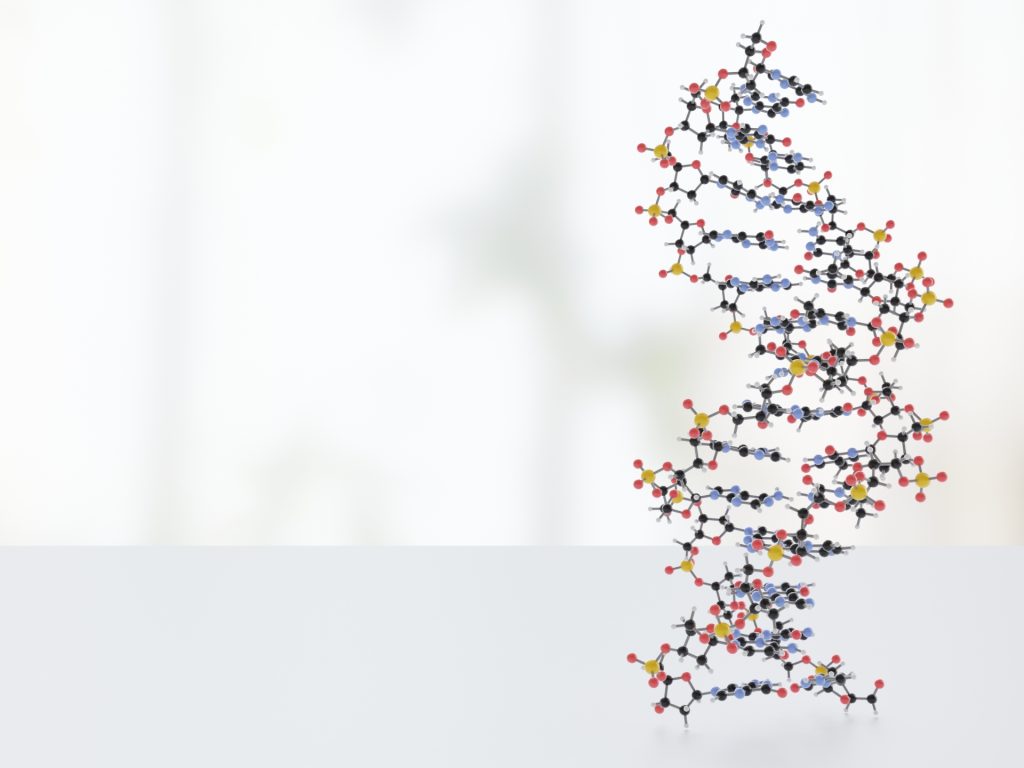
Mental health and stress tolerance vary widely from individual to individual. We know that these differences are determined not only by environmental factors, but also by genetic factors. Recent genetic research has identified genes involved in response to stress, emotional control, and mental resilience.
This article explains how genes affect mental health and stress tolerance and delves into the use of genetic testing to optimize mental health care.
Mental Health and Genetic Relationships

Mental health is largely determined by the balance of neurotransmitters and hormones in the brain. Genes are deeply involved in the secretion of these substances and the function of their receptors.
1. Stress Hormones and Genes
When you are stressed, your body automatically releases stress hormones. The main hormones are cortisol and adrenaline. There are genetic differences in the amount and rate of breakdown of these hormones that affect our tolerance to stress.
- Characteristics of people with high stress tolerance
- Cortisol secretion is properly regulated and calmly handled in stressful situations.
- Fast adrenaline metabolism and smooth recovery from tension.
- Characteristics of people with low stress tolerance
- Excessive secretion of cortisol and tendency to feel stressed for long periods of time.
- Slow adrenaline metabolism and prolonged effects of stress.
2. Serotonin and emotional stability
Serotonin, also known as the “happiness hormone,” plays a major role in emotional stability and stress tolerance. Different genes involved in serotonin secretion and reabsorption have been shown to alter mental health status.
- People with active serotonin secretion
- Positive thinking and easy to pass on stress.
- Less emotional ebbs and flows, and easier to maintain a stable mental state.
- People with low serotonin secretion
- Easily stressed and anxious, with severe mood swings.
- Easily depressed, prolonged effects of stress.
Genetic factors that determine individual differences in response to stress

The response to stress is largely determined by genetic differences, and appropriate stress measures differ for each individual.
1. Ability to cope with acute stress
The ability to cope with sudden stress involves genes related to sympathetic nervous system function. In people with a strong sympathetic nervous system, adrenaline is released as soon as they are stressed, causing an increase in heart rate and blood pressure.
- People with a strong sympathetic nervous system
- Tolerant of short-term stress, but vulnerable to sustained stress.
- It is easy to concentrate in pressure situations.
- People with weak sympathetic nervous system
- They have difficulty coping with sudden stress and are prone to panic.
- However, they are relatively tolerant of long-term stress.
2. Ability to cope with chronic stress
The degree to which the parasympathetic nervous system works well during prolonged periods of stress is important. People with a strong parasympathetic nervous system tend to relax relatively easily and maintain mental stability in stressful situations.
- People with a strong parasympathetic nervous system
- Resistant to chronic stress and easily relaxed.
- Recovers quickly from stress and is mentally calm.
- People with weak parasympathetic nervous system
- Recovery from stress is slow, and the patient tends to be in a constant state of tension.
- Has difficulty relaxing and is prone to anxiety.
Optimizing Mental Health Care Using Genetic Testing

1. How to Increase Stress Tolerance
Once you know your stress tolerance through genetic testing, you can choose appropriate mental health care methods.
- People with high levels of stress hormones
- Meditation and breathing exercises to increase the parasympathetic nervous system.
- Avoid caffeine intake to prevent overexcitement of the nerves.
- People with low serotonin secretion
- Consume foods containing vitamin B6 and tryptophan (bananas, nuts, beans).
- Develop a habit of morning sun exposure to promote the production of serotonin.
2. Consider the balance between environmental factors and genes
Even those who are genetically susceptible to stress can improve their mental strength through environmental factors.
- Moderate exercise: Running and yoga are effective in reducing the release of stress hormones and stabilizing mental health.
- Have social connections: Stress tolerance is more likely to improve when you have more interaction with others.
- Improve the quality of sleep: Since sleep deprivation increases the secretion of stress hormones, it is important to ensure a good night’s sleep.
Deepening Stress Management and Mental Care Using Genetic Information
When genetic testing reveals that stress tolerance and emotional stability are genetically determined, it is possible to provide mental health care accordingly. Since genes have been shown to influence the secretion of stress hormones and the balance of neurotransmitters, it is important to take stress management measures that are appropriate for individual constitutions. This section details stress management using genetic information and the practice of mental care according to genetic characteristics.
1. Stress hormone secretion and its regulation

Types and effects of stress hormones
When stressed, the following hormones are mainly secreted
- Cortisol: responds to long-term stress, regulates energy supply and immune function.
- Adrenaline: causes a short-term stress response and increases heart rate and blood pressure.
- Noradrenaline: enhances concentration, but excessive secretion increases anxiety and tension.
Different genes produce different amounts of these hormones and at different rates of breakdown. This creates some people who are more resistant to stress and others who are more vulnerable.
Characteristics of people with excessive cortisol secretion and countermeasures
People who are genetically prone to excessive cortisol production are vulnerable to chronic stress and are at increased risk for anxiety and depression when under prolonged stress.
counter-measure
- Mindfulness meditation: reduces the secretion of stress hormones and activates the parasympathetic nervous system.
- Consume low GI foods: prevent blood sugar spikes and reduce cortisol overproduction (brown rice, nuts, vegetables, etc.).
- Moderate exercise: reduces stress and promotes cortisol metabolism (walking, yoga).
Characteristics of people with high adrenaline secretion and countermeasures
While high adrenaline levels can help you focus in pressure situations, they can also make you feel overly stressed.
counter-measure
- Breathing practices: slow, deep breathing stabilizes the autonomic nervous system.
- Create a relaxing environment: dim the lights and listen to relaxing music to prevent overproduction of adrenaline.
- Avoid caffeine: it stimulates the sympathetic nervous system, making the body more susceptible to stress.
2. Neurotransmitters that influence stress tolerance

Neurotransmitters influence stress tolerance. In particular, serotonin, dopamine, and GABA (gamma-aminobutyric acid) play important roles.
Characteristics of people with low serotonin secretion and countermeasures
Serotonin is involved in emotional stability, and a deficiency of serotonin can lead to depressed mood and anxiety.
counter-measure
- Consume foods containing tryptophan (bananas, nuts, beans).
- Morning sun exposure: stimulates serotonin synthesis and stabilizes mood.
- Moderate exercise: increases serotonin secretion and reduces stress (running, yoga).
Characteristics of people with high dopamine secretion and countermeasures
Dopamine is a substance that increases pleasure and motivation, but too much of it increases the tendency to seek stimulation and stress.
counter-measure
- Limit screen time: avoid overstimulation of social networking sites and games.
- Create a habitual routine: avoid irregularity and create a stable environment.
- Moderate caffeine intake: prevents overproduction of dopamine and maintains a stable mood.
Characteristics of people with low GABA secretion and countermeasures
GABA is a neurotransmitter that promotes relaxation, and its deficiency increases anxiety and tension.
counter-measure
- Consume fermented foods (natto, kimchi, yogurt).
- Stretching and light exercise: activates the parasympathetic nervous system and stimulates GABA secretion.
- Drink herbal teas: Chamomile and lavender herbal teas help GABA secretion.
Deepening Stress Management and Mental Care Using Genetic Information

Stress management using genetic information is more than just a way to relax or improve health habits. A more individualized approach is required, as different genes have different susceptibilities to stress and different ways of coping with it. This article explores the genetic factors of stress tolerance and mental health care in more depth and presents specific practices accordingly.
1. Genetic types susceptible to stress and countermeasures
Reactions to stress vary according to genetic differences. Some people are genetically more susceptible to stress than others, and each requires appropriate coping strategies.
Characteristics of people with high stress sensitivity and countermeasures
People with a genetic type that is sensitive to stress tend to react strongly to even minor changes in their environment and are prone to persistent anxiety and tension. People with this type tend to overproduce stress hormones and have a weak parasympathetic nervous system.
counter-measure
- Creating an environment that reduces stress: Ensure a quiet, calm space and reduce stimulation.
- Mindfulness meditation: regulates breathing and reduces excessive activation of the sympathetic nervous system.
- Aromatherapy: Utilize essential oils such as lavender and bergamot to increase the parasympathetic nervous system.
- Limit caffeine intake: reduce intake of coffee and energy drinks to prevent overproduction of cortisol.
Characteristics of people with high stress tolerance and countermeasures
Stress-tolerant genetic types tend to be relatively calm in high-pressure situations and can easily tolerate long-term stress. However, even though they have a high stress tolerance, they need to manage stress in moderation, as too much exertion can cause physical strain to accumulate.
counter-measure
- Adopt moderate stress reduction methods: Although it is difficult to feel strong stress, light exercise and hobbies should be taken up on a regular basis, as the burden can accumulate unconsciously.
- Get a good night’s sleep: 7 to 8 hours of sleep to prevent autonomic imbalance.
- Engage in moderate social activities: People who have difficulty feeling stress tend to keep to themselves, so they regularly interact with others to provide mental care.
2. Genetic differences in mental health and optimal self-care
It is known that different genes have different mental health conditions. Here are some characteristics of mental health conditions due to genetic differences and how to self-care accordingly.
Characteristics of people prone to depressive tendencies and countermeasures
People who are genetically predisposed to depression often have low levels of serotonin and dopamine secretion and tend to have large emotional ups and downs.
counter-measure
- Exposure to sunlight: stimulates serotonin secretion and prevents mood swings.
- Consume foods containing tryptophan: foods such as bananas, nuts, and legumes are effective.
- Moderate exercise: Running or walking improves the balance of neurotransmitters in the brain.
- Output feelings: organize negative feelings by keeping a journal or talking to someone you trust.
Characteristics of people prone to anxiety and countermeasures
Genetic types who are prone to anxiety tend to have an imbalance of noradrenaline and GABA, and tend to overreact to even the smallest things.
counter-measure
- Make deep breathing and meditation a habit: reduce sympathetic over-activation.
- Drink herbal teas: chamomile and lemongrass have a relaxing effect.
- Stretching for the autonomic nervous system: yoga and light stretching to relieve tension.
- Focus on the “now”: Practice mindfulness that focuses on the present situation, not on past or future anxieties.
Further Optimization of Mental Health Using Genetic Information

By utilizing genetic information, it is possible to better understand individual mental health characteristics and take appropriate measures. Since stress tolerance and emotional stability are shaped by the interaction of genes and the environment, understanding one’s genetic characteristics allows one to practice more effective stress management and mental health care. This section details further gene-based approaches to mental care.
1. Aspects of Mental Health Influenced by Genes
Increased stress tolerance
Some people are born with a high stress tolerance, while others are acquired and strengthened by their environment. People with genetically low stress tolerance tend to secrete more cortisol and feel more tense and anxious. For these types of people, it is important to consciously activate the parasympathetic nervous system and develop relaxing habits.
For example, incorporating meditation and deep breathing into one’s daily routine can reduce the secretion of stress hormones and promote mental stability. In addition, moderate exercise consumes stress hormones and balances the nervous system, which is especially beneficial for people with low stress tolerance.
On the other hand, people with genetically high stress tolerance, while tolerant of short-term stress, tend to be unaware of long-term stress. Therefore, it is important to know your limits and set aside time to release stress on a regular basis.
Emotional Control
The intensity of emotional ups and downs and the ability to control anger and sadness are also factors influenced by genes. In particular, differences in the genes involved in serotonin and dopamine secretion can affect emotional stability.
People with low serotonin secretion are characterized by a tendency to feel depressed and may be more prone to depression. In this case, it is important to stimulate serotonin secretion through diet and exercise. In particular, foods containing tryptophan (bananas, nuts, dairy products) can support serotonin production.
People with high dopamine secretion tend to seek stimulation more easily and are at higher risk for addiction. Avoiding overstimulation and finding peaceful enjoyment in daily life can help maintain emotional stability.
2. Specific methods of stress management based on genetic information
Sleep Optimization
Sleep quality has a significant impact on mental health. People who are genetically prone to poor sleep tend to be more stressed and have slower mental recovery.
To improve sleep quality, it is important to review your pre-bedtime habits. For example, refraining from using smartphones and computers one hour before bedtime and darkening the room can promote melatonin secretion. Also, avoiding caffeine intake before bedtime and incorporating relaxing music or aromas can help achieve a deeper sleep.
In addition, for those who are genetically prone to disrupted sleep rhythms, getting into the habit of going to bed and getting up at the same time each day can help regulate the body’s internal clock.
Nutrition and Stress Management
Stress increases the consumption of vitamins and minerals in the body. B vitamins, magnesium, and omega-3 fatty acids are especially important for stress tolerance.
B vitamins support nerve function and energy metabolism, making the body less susceptible to the effects of stress. In particular, B6 and B12 are involved in the production of neurotransmitters, and a deficiency of these vitamins makes the body more susceptible to stress.
Magnesium reduces nervous excitement and promotes relaxation. Since it is easily consumed when stressed, it is recommended to actively consume nuts, spinach, and seafood.
Omega-3 fatty acids support brain function and regulate the secretion of stress hormones. They can be obtained from bluefish, flaxseed oil, and chia seeds to help maintain mental health.
A Practical Approach to Improve Stress Tolerance Using Genetic Information
By utilizing genetic information, it is possible to find the right stress management and mental health care strategies for you and take more effective measures. The right combination of daily habits, nutrition, exercise, and relaxation techniques is critical to improving stress tolerance. This section details practical ways to improve stress tolerance based on genetic characteristics.
1. Stress hormone regulation and lifestyle optimization

Balancing cortisol and adrenaline, which are secreted in response to stress, is essential to maintaining mental health. Excessive secretion of these hormones can lead to increased chronic stress and anxiety, which can be detrimental to mental and physical health.
Lifestyle habits that stabilize stress hormones
- Ensure a certain amount of sleep: Aim for 7-8 hours of sleep, as sleep deprivation increases the secretion of stress hormones, which in turn increases anxiety and tension.
- Establish a habit of sun exposure: Morning exposure to light resets the body’s internal clock and properly regulates the secretion of stress hormones.
- Maintain a regular diet: a balanced diet is important because rapid fluctuations in blood glucose levels cause an overproduction of stress hormones.
- Incorporate moderate exercise: light jogging, yoga, and other forms of exercise can reduce stress hormones and promote relaxation.
2. Diet and supplements to balance neurotransmitters
Brain neurotransmitters such as serotonin, dopamine, and GABA play a major role in stress tolerance and emotional stability. Balancing these factors can improve mental health.
Diet to increase serotonin
Serotonin, also known as the “happiness hormone,” helps stabilize mood. The production of serotonin requires an amino acid called tryptophan, and consuming foods rich in this amino acid can help stabilize mental health.
- Foods high in tryptophan: bananas, nuts, dairy products, soy products, red fish
- Foods containing vitamin B6 and magnesium: spinach, avocado, brown rice, pumpkin seeds
A diet that balances dopamine
Dopamine is a neurotransmitter involved in motivation and concentration, but overproduction can lead to overstimulation and increased stress.
- Consume adequate amounts of protein: eggs, chicken, beef, and beans help balance dopamine.
- Avoid overstimulants: Excessive intake of caffeine and refined sugar can cause a rapid release of dopamine, leading to increased stress.
Foods that increase GABA and promote relaxation
GABA is a neurotransmitter that reduces nervous excitement and promotes relaxation. A deficiency of GABA increases anxiety and tension, so it is important to consciously increase GABA.
- Foods rich in GABA: fermented foods (natto, yogurt, miso), green tea, tomatoes
- Use herbs and supplements: herbal teas of chamomile and lemongrass help GABA secretion.
3. Psychological Approaches to Stress Management
Mindfulness Meditation
Mindfulness meditation can help reduce the release of stress hormones and improve stress tolerance. Simply focusing on your breathing in a quiet place for 5-10 minutes each day can help balance the nervous system.
Journaling (recording emotions)
The habit of journaling when you feel stressed can help you to objectively assess your emotions and identify the causes of stress. In addition, keeping a gratitude journal can help foster positive thinking.
Self-Compassion (Self-Acceptance Practice)
People who are vulnerable to stress tend to be too hard on themselves. It is easier to reduce stress by acknowledging that you are doing well enough, rather than blaming yourself for your failures and weaknesses.
By utilizing genetic information, we can gain a deeper understanding of stress tolerance and mental health characteristics and take the most appropriate measures for each individual. By adjusting stress hormones, maintaining neurotransmitter balance, and incorporating appropriate diet, exercise, and mindfulness meditation, it is possible to maintain a healthy mind while compensating for genetic weaknesses.
It is also important to utilize genetic testing in conjunction with lifestyle changes and flexible, data-driven stress management. Continued regular self-analysis and lifestyle optimization will help maintain long-term mental health.


